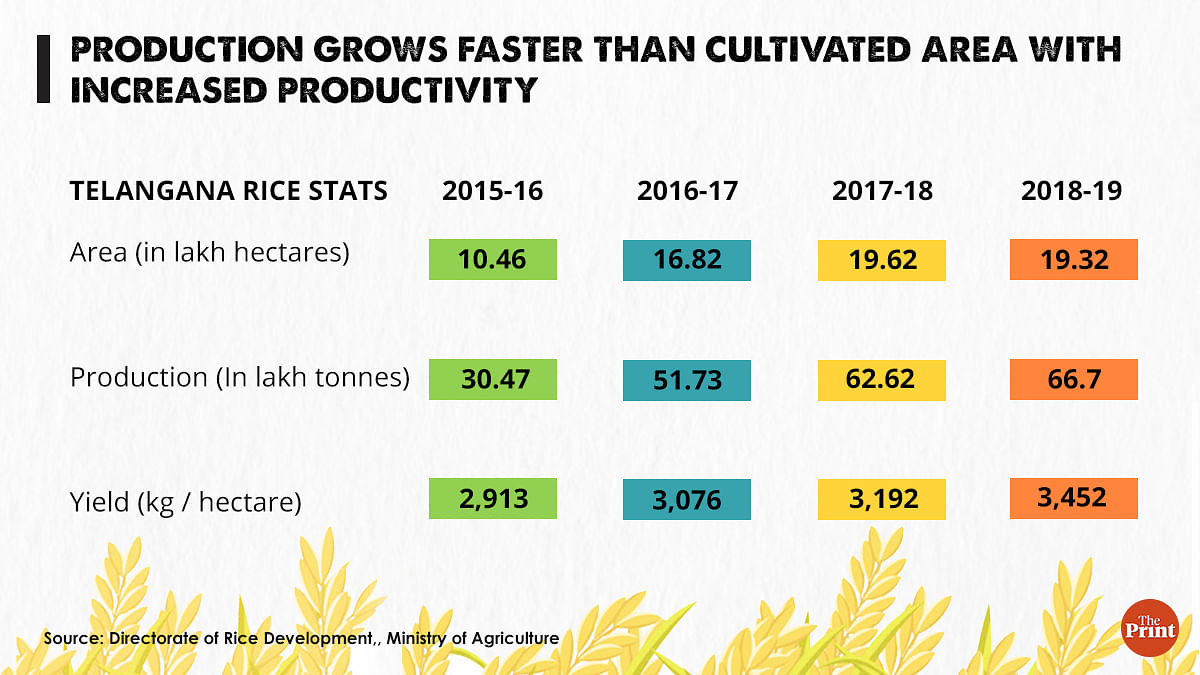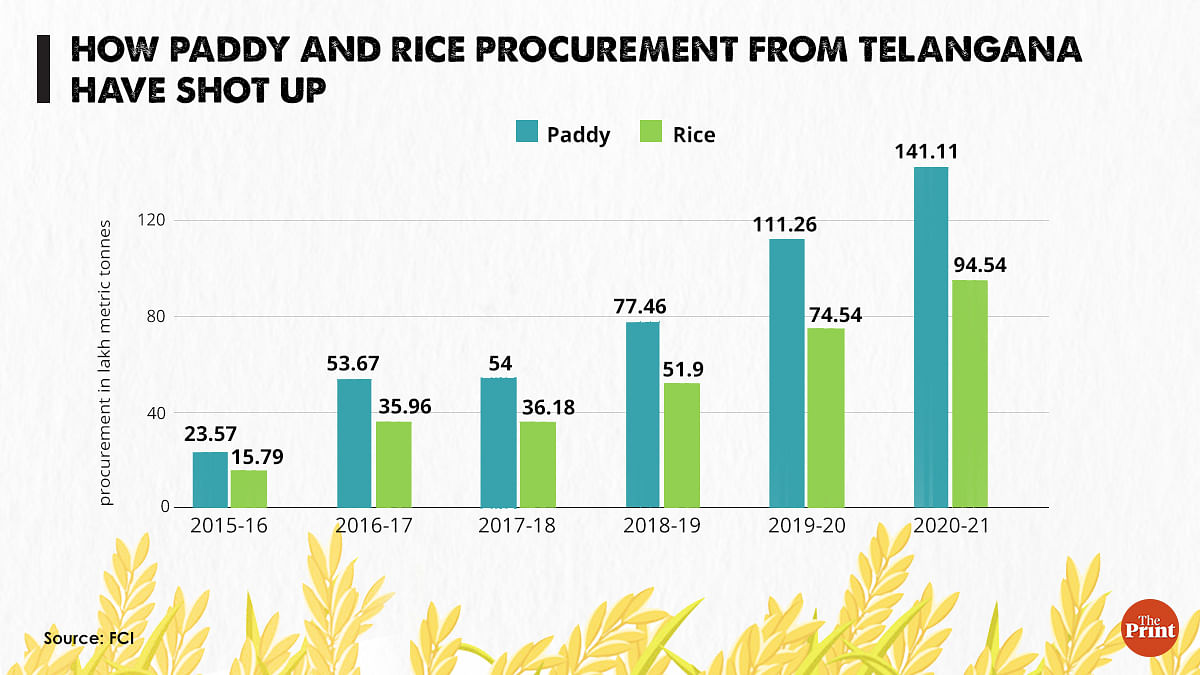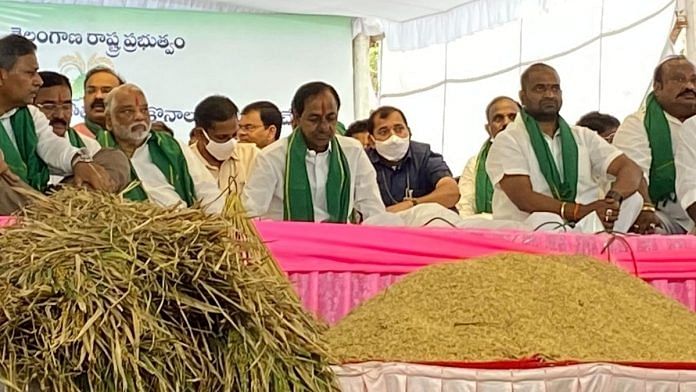Hyderabad/New Delhi: This Friday, the Narendra Modi government told a delegation of ministers from Telangana that it should ask farmers to opt out of paddy cultivation in the Rabi (winter) season, reiterating that the Food Corporation of India (FCI) wouldn’t procure the parboiled rice the state produces.
This brought Chief Minister K. Chandrashekar Rao’s fight for paddy procurement to a dead end, and now, he is likely to announce an “action plan for alternative cropping” soon, with instructions to cease parboiled rice production in Telangana, ThePrint has learnt.
Telangana’s demand was that the FCI should complete the balance procurement of five lakh metric tonnes of rice produced in the previous Rabi season, and declare the annual procurement target on how much it would procure in the Kharif and Rabi seasons.
The issue has left an estimated 21 lakh farmers in limbo, and sparked a conflict between KCR’s Telangana Rashtra Samithi (TRS) and the Bharatiya Janata Party (BJP).
On Saturday, Telangana’s Chief Secretary Somesh Kumar issued a press note, asking farmers to not take up paddy cultivation during the Rabi season. “It is pertinent that farmers should not take up paddy cultivation in Rabi. Farmers who have tie-up with seed companies, tie-up with millers or for self-consumption, can take up paddy at their own risk,” Kumar said.
State Agriculture Minister Niranjan Reddy, who was among a delegation of Telangana ministers who met Union Minister of Consumer Affairs, Food and Public Distribution Piyush Goyal Friday, said the Centre made it clear that it would not buy the Rabi season’s rice from the state and asked farmers to not sow paddy.
“The state was also asking the Centre to give us a target on how much they would procure. But Piyush Goyal denied (the request), saying it is not possible to give a yearly target. All that they told us clearly was to not go for paddy cultivation in Rabi season. It is very disappointing,” Reddy said Friday, after the second meeting of its kind.
Keshav Rao, a TRS Rajya Sabha MP, told ThePrint: “The chief minister will soon announce an action plan for alternative cropping. The Centre has refused to take parboiled rice, saying there is no market, and we have to admit that. The chief minister will also soon make an announcement that there is to be no parboiled rice production in the state.”
Farmers in the lurch over ‘politics’
Telangana has seen a massive rise in paddy production — largely thanks to the state government’s irrigation projects — over the past few years, forcing governments to increase procurement. However, with supply outstripping demand, the Centre has refused to continue procuring the parboiled rice produced in the Rabi (winter) season, citing full stocks and the drain on the exchequer.
With the onset of the Rabi season, lakhs of farmers who grow paddy in Telangana have been left in limbo.
The issue has become a bone of contention between the chief minister and the BJP-led government at the Centre, with KCR turning up the heat over the past few weeks.
The issue gathered steam days after the BJP defeated the TRS in a bypoll to the Huzurabad Assembly seat on 2 November. State BJP chief Bandi Sanjay encouraged farmers to cultivate paddy in the Rabi season, against the state government’s advice. The BJP also accused the state government of not procuring paddy. KCR began his war of words against the BJP in response to this, and accused the state BJP of misleading farmers.
Last week, he took to the streets to protest — his first protest as chief minister.
KCR arrived in Delhi Sunday with a delegation of ministers who met Goyal. The chief minister had wanted to meet Prime Minister Narendra Modi over the issue, but reportedly couldn’t get an appointment. KCR left after four days in the capital without having met either the prime minister or Union Home Minister Amit Shah.
Political analysts note that an issue between the ‘governments’ has become a political conflict between the ‘parties’.
“We cannot deny that there is a genuine paddy procurement problem in Telangana, but the parties (including the chief minister) have been using it for political mileage,” senior political analyst Telakapalli Ravi told ThePrint.
Also read: Telangana bypoll: BJP wins Huzurabad ‘grudge match’, KCR’s ex-aide Eatala Rajender beats TRS
Lack of demand and other issues
Experts pointed out that Telangana, one of the biggest paddy cultivators in the country, has seen an exponential rise in production thanks to massive irrigation projects being developed by the government. For example, the KCR government is working on the Kaleshwaram Lift Irrigation Project, touted as one of the largest irrigation projects in the world. It comprises about 20 reservoirs and is expected to irrigate 18.3 lakh acres of land.
Kiran Vissa, co-founder of Rythu Swarajya Vedika, a farmers’ organisation that works with small and mid-level farmers in Telangana and Andhra Pradesh, told ThePrint that the government needed to consider demand too.
“The state government can’t just think of making Telangana the ‘rice bowl’ of the country without thinking about demand. There is only so much demand and consumption of rice. The government should have been far-sighted when it was developing these irrigation projects,” Vissa said.

How paddy production, cultivated area and yield all rose in Telangana between 2015 and 2019 | Infographic: Ramandeep Kaur | ThePrint
Most of the paddy cultivated in the state is either processed into raw rice or common varieties. In Rabi season (November-April), however, the paddy is processed as parboiled — partially boiled, soaked and dried — rather than raw rice. This is because the high temperatures in summers lead to the breakage of rice.
For instance, the recovery rate of paddy to rice is usually 65 per cent during the Kharif season (June-October) and 62 per cent during Rabi. However, if the rice is not parboiled, the recovery rate is quite low as there is at least 30 per cent of broken rice when paddy is processed during Rabi. In essence, parboiled rice is a product limited to the Rabi season.
The FCI, for 2020-21, agreed to procure 20 LMT additional parboiled rice from Telangana on the state government’s request, in addition to the 24.7 LMT quantity agreed earlier. The procurement process usually involves state and central governments.
The Telangana Civil Supplies Corporation purchases paddy from farmers for a minimum support price (MSP) through its procurement centres at the village level. The purchased stock is then sent to hundreds of private millers in the state. The stock is then processed as Custom Milled Rice (CMR), following the FCI’s requirements. The FCI then procures the milled rice and stores the rice grains for use in the Public Distribution System.
The FCI, in September, had announced that it would no longer procure parboiled rice from Telangana (from the 2021-22 Rabi season) citing sufficient stocks to last the next four years at least. Since then, the Telangana government has been asking farmers not to sow paddy in the upcoming season, and shift to alternative crops. The chief minister said cultivating paddy would be no better than the farmers hanging themselves. At least two farmers reportedly committed suicide in November alone over the paddy issue.
According to the FCI’s data, the rice procurement from Telangana in 2017-18 was 36.18 lakh metric tonnes, which shot up to 94.54 metric tonnes by 2020-21. Similarly, paddy production in the state has increased nearly fivefold. From 52 lakh metric tonnes in 2016-2017, it has now reached 2.5 crore metric tonnes for 2020-21 (for both Rabi and Kharif seasons). The area under paddy cultivation has also increased, but not proportionally to the increase in yield. This is because productivity has improved, largely thanks to the irrigation projects.

“The total food grain procurement that will be taken up by the FCI and state agencies is agreed upon mutually by the state and the Centre in multiple meetings before every Rabi and Kharif procurement season. The department and the FCI made it clear last year — when it bailed out the state by procuring parboiled rice for the last time — that no such procurement would be made in future,” an FCI official told ThePrint on the condition of anonymity.
“Telangana doesn’t consume parboiled rice but produces it for procurement. This must then be transported to consuming states such as Kerala, Tamil Nadu, and Bihar. However, these states’ own production and procurement have increased significantly in recent years, making the idea of procuring rice from Telangana and storing, handling and distributing it very unviable,” the official explained.
“All expenditures incurred by the state government on procurement, storage and distribution of food grain stocks, including the excess that is handed over to the FCI, are reimbursed by the Government of India. Therefore, procuring more parboiled rice will increase the burden on the exchequer,” added the official.
However, T. Nanda Kumar, a former Union food and public distribution secretary, said, “If the FCI or the Centre were very sure that parboiled rice was something they couldn’t sell to other states, they should have given the state a production and procurement plan much earlier. They should also have discussed this with their agriculture department and said, don’t plant this paddy or its high yielding varieties, which farmers must have been growing to maximise their profits.”
Also read: Why Telangana is seeing an increase in violent clashes between tribals & forest officials
Alternative crops: A way out?
The KCR government is keen to encourage alternative cropping patterns instead of rice. However, experts pointed out that the shift won’t be easy, and might take “years” to be implemented. They added that there needs to be a proper “framework” from the state government, which should include incentives for farmers.
Despite the government’s encouragement of alternative crops, farmers have largely stuck to paddy cultivation, as it is less labour-intensive compared to other options such as cotton.
“The Centre has been changing its stand too quickly. It is too much to ask farmers to shift to another crop, which usually takes two-three years. The government needs to act on different fronts, starting from seed availability, processing, and marketing,” said Vissa.
“There are options such as oilseeds and pulses. Currently, around 70 per cent of oilseeds are imported, and we largely depend on imports even for pulses. So, if we can work according to our own country’s requirements, it would go a long way,” Vissa added.
(Edited by Rohan Manoj)
Also read: 2021 monsoon shows impact of climate change. Here’s what it’s doing to kharif crops



